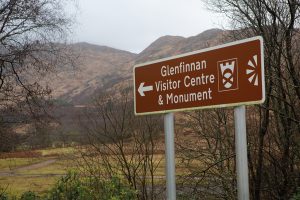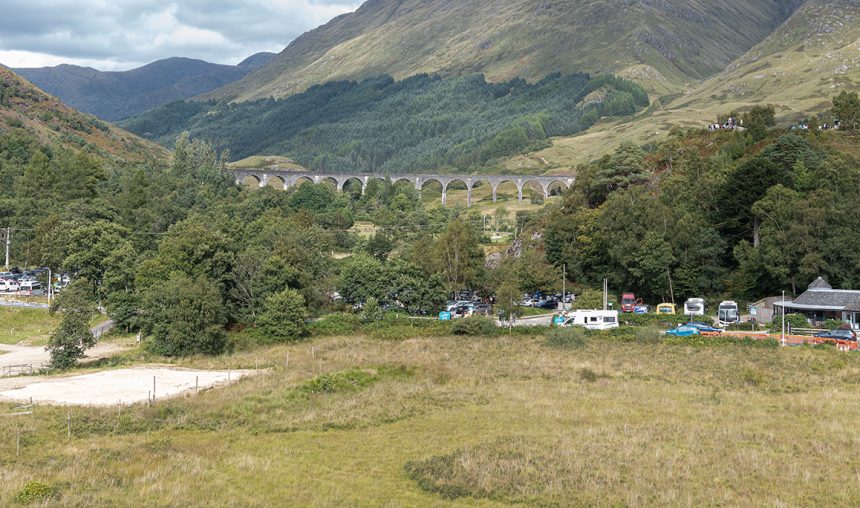The National Trust for Scotland’s Glenfinnan visitor centre is one of the latest tourist destinations to come under fire for its coach parking strategy.
The visitor centre, part of the Glenfinnan Monument, Trail and Viaduct viewpoint at the northern end of Loch Shiel in the Scottish Highlands, introduced a £1-per-passenger fee for coaches on 1 April. It marks the first time parking charges have been introduced for coaches.
Operators and trade bodies have reacted saying the per-passenger charge disproportionately targets coaches, has not been communicated effectively and forms part of a worrying landscape of anti-coach sentiment prevailing across the UK. It joins other recent high profile cases in Bourton-on-the-Water and Truro where critics have highlighted a poor approach to coach parking facilities.
‘Poor communication’
routeone understands that the Confederation of Passenger Transport (CPT) met with the National Trust for Scotland unilaterally in Edinburgh in March, after it had written to the organisation on 19 February following rumblings by operators that the new charge was being introduced.
Having been given no prior notice, CPT notes that little could be done at that stage to stop the changes. However, subsequent meetings did result in the Trust halving its originally intended £2 fee until 2025.
Operations Director at Maynes Coaches, Kevin Mayne, was one of the first to notify CPT and UKCOA about the introduction of the charges. The operator has blacklisted the site as a rest stop without prior approval from its clients.

The result, he argues, will be a kick back and reduction in coach traffic that may force the site to re-think its strategy. He notes a similar situation at Culloden Battlefield circa 2017, when a £10 coach parking charge was introduced for approximately three weeks before a reduction in coach traffic saw the charge removed.
While an option now exists for tour companies to pre-book a visit to the site and purchase a voucher to park, part of the problem lies in the ad-hoc nature of coach tourism in the region. Mr Mayne warns that the Glenfinnan site is often used as a short stop, and the charges may take tour organisers and drivers by surprise, meaning operators must absorb the cost at short notice. There may then be reluctance to deviate from planned routes to avoid the risk of incurring unexpected expenses.
This, Mr Mayne argues, could have been avoided if the Trust had reached out to operators to establish a reasonable parking charge.
“If the fee to park was fixed at £10, I don’t think anybody would mind,” he explains. “But if a coach with 60 passengers arrives, it equates to £60 for a half-hour stop, rising to £120 next year.
A client will not pay for that charge if it has not been mentioned or included in the itinerary. The cost has to be passed on somewhere or absorbed by the operator. Drivers will get savvy and seek out alternatives. It is a sad state of affairs, and we need to see operators and destinations working more closely together to understand how to make their needs align.”
Trust defends position
The National Trust for Scotland tells routeone that the charges come off the back of exceptional growth in footfall at its visitor centre at Glenfinnan, citing an “unprecedented 540,000 visitors, a rise of 40% in 2022”. That, it says, is putting a strain on the village, and parking.
It reasons that its charges are “less than the approximate charge per person that the average car pays” and are a way of managing the high level of visitation. It adds that the coach parking charge was communicated to coach parties in January, and that it has been meeting with representatives from the coach industry and tour operators throughout April and is happy to continue those conversations. It did not however comment on whether it plans to reassess the pricing structure based on outcomes or feedback, or if there were any factors that might trigger a reassessment of the charges.
“The National Trust for Scotland and all in the community are working hard to find a way to welcome visitors in a way that is manageable for the available facilities, and which gives everyone a good experience,” a spokesperson says. “We are introducing a modest parking charge for coaches and buses for the high season from 1 April–31 October. The funds our charity raises from this charge will be dedicated to current and future investment at Glenfinnan, so that we can manage the issues created by its popularity and ensure a good arrival experience for all visitors, including coaches and group visitors.
“We value the fact that visitors who arrive by coach and bus have arrived more sustainably than if they had driven individually by car. A coach parking charge equivalent to £1 per passenger is deliberately less than the approximate charge per person that the average car pays when they park in Glenfinnan.
“We did not take the decision to introduce coach parking charges lightly and our charity always aims to give travel trade clients as much notice as possible. However, the situation in Glenfinnan is exceptional, in terms of both levels of visitation and impacts on the local area.
“We look forward to working together with coach and bus operators in 2024 and beyond and hope they will work with us to ensure the introduction of coach parking charges runs as smoothly as possible this year. We will keep them informed as our redevelopment project at Glenfinnan continues to progress.”
Maynes Coaches hosted a CPT Coach Commission meeting in May with the Scottish Minister for Tourism, alongside representatives from Visit Scotland and the Scottish Tourism Alliance. One of the hot topics discussed across the table was to ensure coaches are being given a warm welcome by destinations following COVID-19 tourism recovery.
The meeting follows complaints that many coach parking spaces in the Highlands have been removed to be replaced by car parking or motorhome spaces under recent Scottish government initiatives.




























